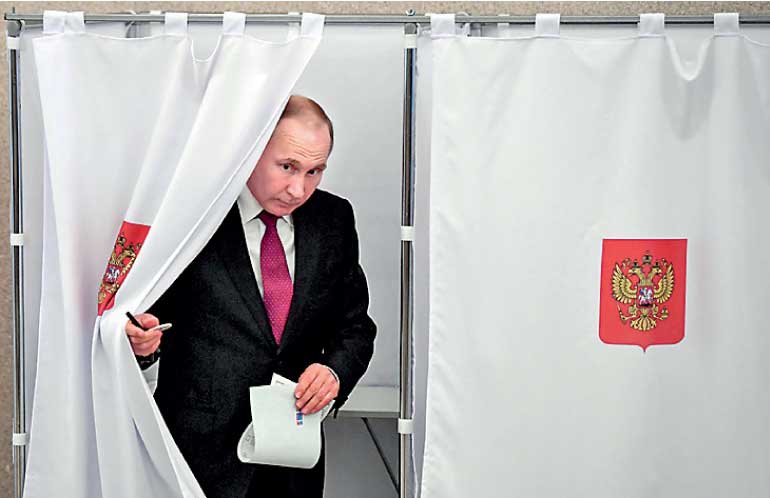Wednesday Mar 05, 2025
Wednesday Mar 05, 2025
Monday, 19 March 2018 02:09 - - {{hitsCtrl.values.hits}}

Ust-Djeguta, Russia (Reuters): Russians voted in a presidential election on Sunday that was expected to give Vladimir Putin an easy victory, but his opponents alleged officials were compelling people to come to the polls so that a low turnout does not tarnish the win.
Opinion polls give Putin, the incumbent, support of around 70 percent, or nearly 10 times the backing of his nearest challenger.
Another term will take him to nearly a quarter century in power — a longevity among Kremlin leaders second only to Soviet dictator Josef Stalin.
Many voters credit Putin, a 65-year-old former KGB spy, with standing up for Russia’s interests in what they view as a hostile outside world.
Russia’s annexation of Ukraine’s Crimea region, alleged Kremlin meddling in the U.S. presidential election, and Moscow’s bombing campaign in Syria, have been condemned in the West. But for most people at home, they have only burnished Putin’s reputation as a strong leader.
A row with Britain over allegations the Kremlin used a nerve toxin to poison a Russian double agent in a sleepy English city — denied by Moscow — has not dented Putin’s standing.
“I voted for Putin,” said LyubovKachan, a teacher in the settlement of Ust-Djeguta, in southern Russia.
“If anything is not going our way right now, that’s thanks to the world which treats us so negatively, while he is trying to stand up to that,” she said.The biggest headache for Putin’s campaign was the possibility many voters, including Putin supporters, would not bother to come to the polls because they felt the outcome was already a foregone conclusion.
Putin opponents alleged employers with close ties to the state were ordering staff to go and vote, and send back evidence.
Reuters reporters witnessed multiple people in different locations voting in groups, and then taking photos of themselves in front of the ballot boxes on their phones. Some arrived at polling stations on board private-hire buses.
In polling station 1515 in Zelenodolsk, 800 km (500 miles) east of Moscow, five people photographed themselves voting. Asked by a Reuters reporter why, one of the group, a young woman, said: “What do you mean why? It’s a photographic report for our bosses.”
At polling station number 216 in Ust-Djeguta, Marina Kostina was supervising two teenage girls who were photographing voters. Asked why one woman was photographed, Kostina said: “Her work asked her to report back.”
A low turnout would diminish Putin’s authority within the ruling elite, which is founded in large part on his ability to mobilise the public behind him.
“There is no intrigue. I do not see any point for me in going to the election,” said Alexei Khvorostov, a resident of Krasnodar, in southern Russia.
Turnout was at 34.7% by 1235 GMT, official data showed.
The first politician in years to challenge the Kremlin’s grip on power, Alexei Navalny, is barred from the race because of a corruption conviction he says was fabricated by the Kremlin. He is calling for a boycott of the election, saying it is an undemocratic farce.
Navalny’s headquarters said activists sent out to monitor the vote reported people being bussed to polling stations by their employers.
“We would call this the ‘shuttle bus election’,” Ivan Zhdanov, a Navalny aide, told a briefing.
A day of voting across Russia’s 11 time zones began at 2000 GMT on Saturday on Russia’s eastern edge, in the Pacific coast city of Petropavlovsk-Kamchatsky. Voting will run until polls close at the westernmost point of Russia, the Kaliningrad region on the Baltic Sea, at 1800 GMT on Sunday.
The majority of voters see no viable alternative to Putin: he has total dominance of the political scene and state-run television, where most people get their news, gives lavish coverage of Putin and little airtime to his rivals.
Many Russians believe he has restored stability after the chaos that ensued after the Soviet Union collapsed.
Discover Kapruka, the leading online shopping platform in Sri Lanka, where you can conveniently send Gifts and Flowers to your loved ones for any event including Valentine ’s Day. Explore a wide range of popular Shopping Categories on Kapruka, including Toys, Groceries, Electronics, Birthday Cakes, Fruits, Chocolates, Flower Bouquets, Clothing, Watches, Lingerie, Gift Sets and Jewellery. Also if you’re interested in selling with Kapruka, Partner Central by Kapruka is the best solution to start with. Moreover, through Kapruka Global Shop, you can also enjoy the convenience of purchasing products from renowned platforms like Amazon and eBay and have them delivered to Sri Lanka.
Discover Kapruka, the leading online shopping platform in Sri Lanka, where you can conveniently send Gifts and Flowers to your loved ones for any event including Valentine ’s Day. Explore a wide range of popular Shopping Categories on Kapruka, including Toys, Groceries, Electronics, Birthday Cakes, Fruits, Chocolates, Flower Bouquets, Clothing, Watches, Lingerie, Gift Sets and Jewellery. Also if you’re interested in selling with Kapruka, Partner Central by Kapruka is the best solution to start with. Moreover, through Kapruka Global Shop, you can also enjoy the convenience of purchasing products from renowned platforms like Amazon and eBay and have them delivered to Sri Lanka.